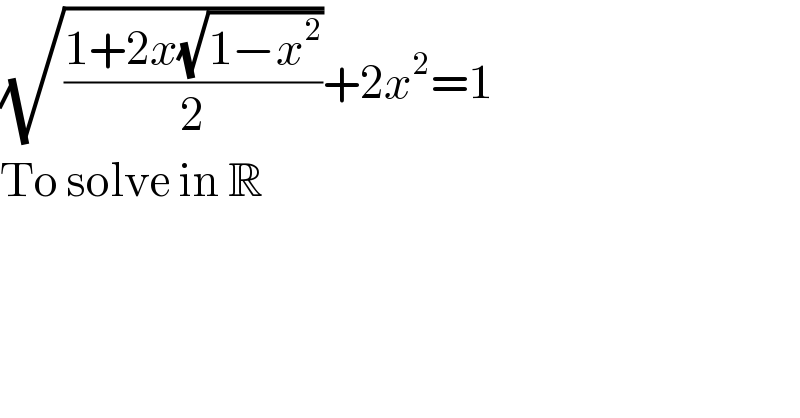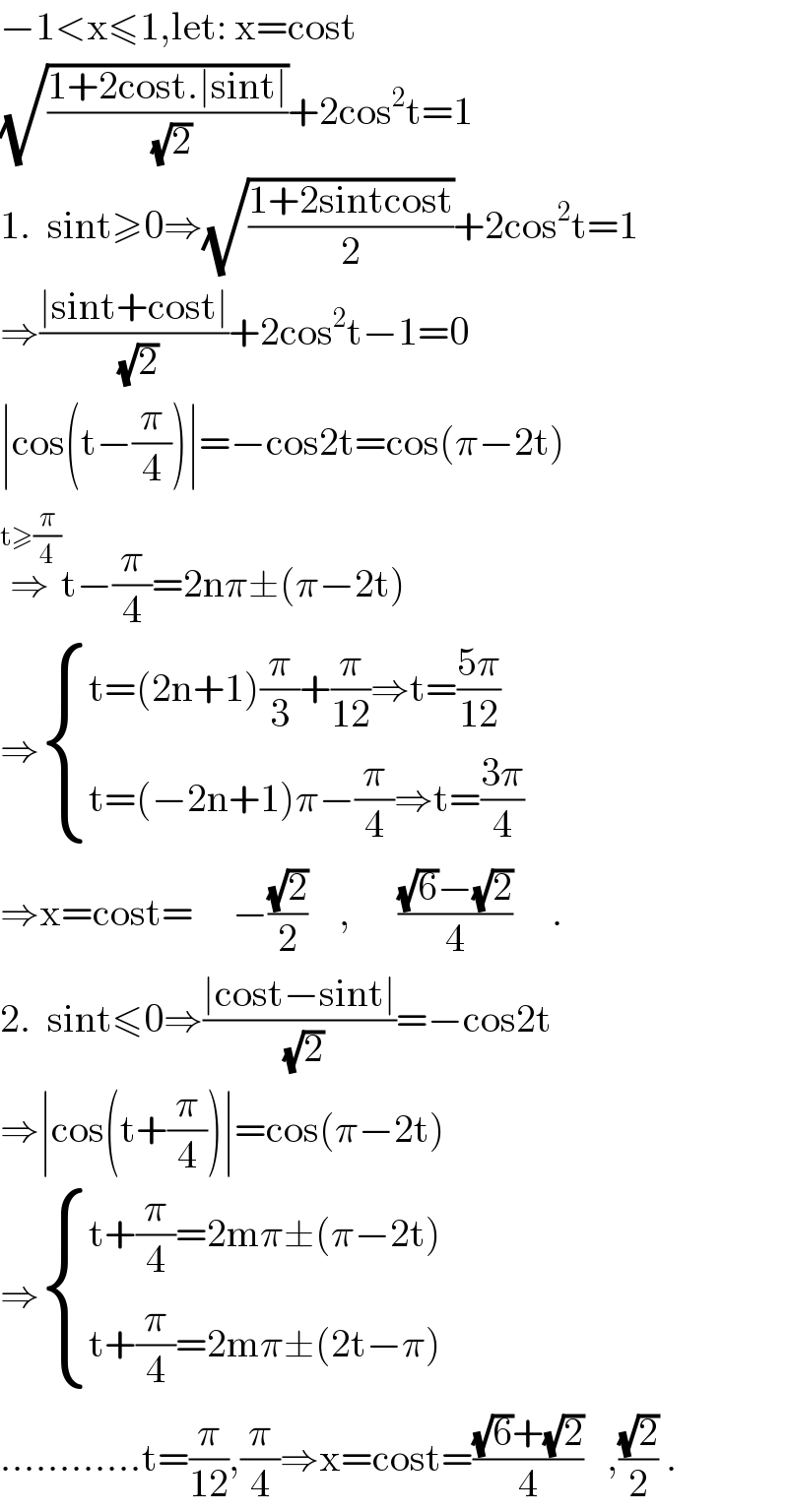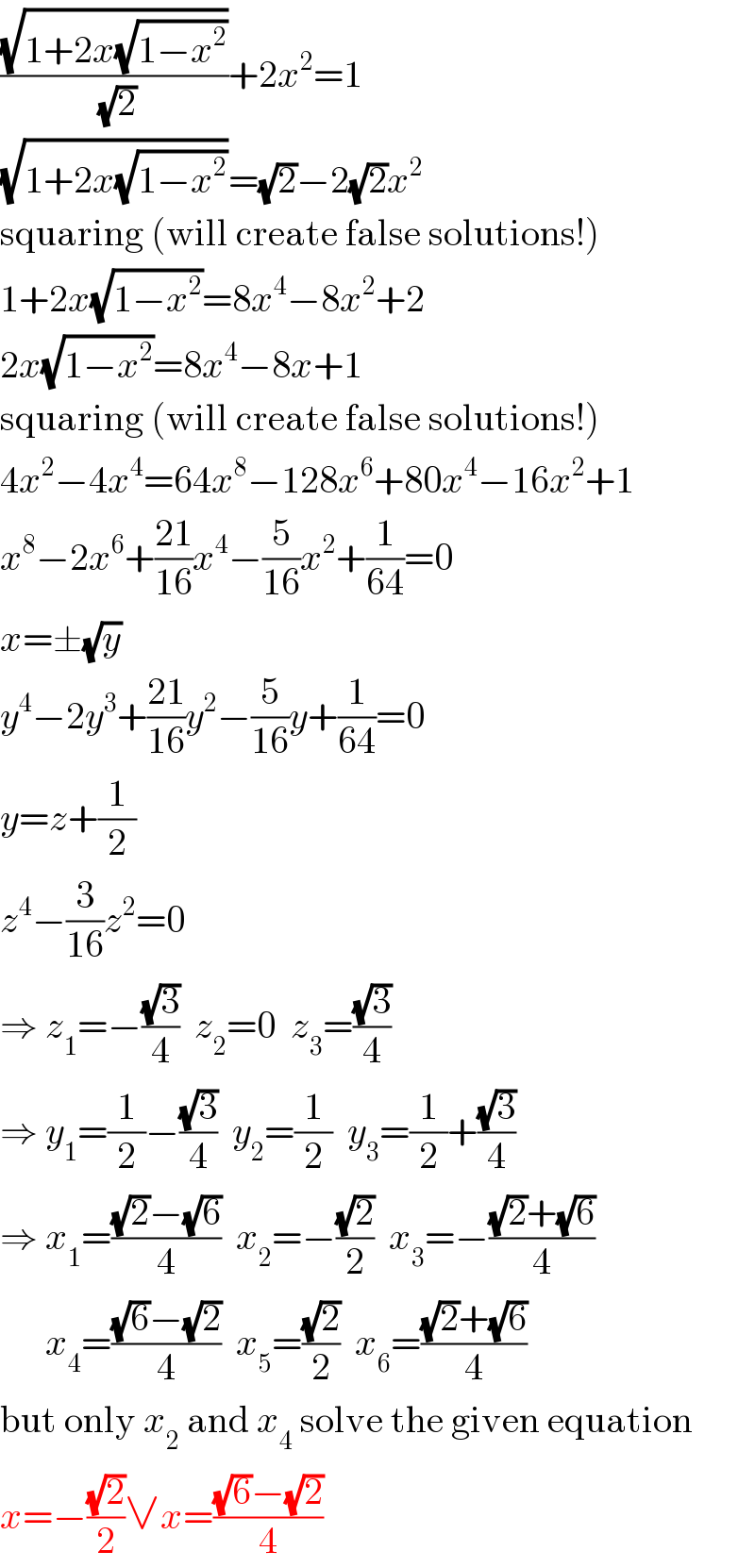
Question Number 64631 by Mikael last updated on 19/Jul/19

$$\sqrt{\frac{\mathrm{1}+\mathrm{2}{x}\sqrt{\mathrm{1}−{x}^{\mathrm{2}} }}{\mathrm{2}}}+\mathrm{2}{x}^{\mathrm{2}} =\mathrm{1} \\ $$$$\mathrm{To}\:\mathrm{solve}\:\mathrm{in}\:\mathbb{R} \\ $$
Commented by behi83417@gmail.com last updated on 20/Jul/19

$$−\mathrm{1}<\mathrm{x}\leqslant\mathrm{1},\mathrm{let}:\:\mathrm{x}=\mathrm{cost} \\ $$$$\sqrt{\frac{\mathrm{1}+\mathrm{2cost}.\mid\mathrm{sint}\mid}{\sqrt{\mathrm{2}}}}+\mathrm{2cos}^{\mathrm{2}} \mathrm{t}=\mathrm{1} \\ $$$$\mathrm{1}.\:\:\mathrm{sint}\geqslant\mathrm{0}\Rightarrow\sqrt{\frac{\mathrm{1}+\mathrm{2sintcost}}{\mathrm{2}}}+\mathrm{2cos}^{\mathrm{2}} \mathrm{t}=\mathrm{1} \\ $$$$\Rightarrow\frac{\mid\mathrm{sint}+\mathrm{cost}\mid}{\sqrt{\mathrm{2}}}+\mathrm{2cos}^{\mathrm{2}} \mathrm{t}−\mathrm{1}=\mathrm{0} \\ $$$$\mid\mathrm{cos}\left(\mathrm{t}−\frac{\pi}{\mathrm{4}}\right)\mid=−\mathrm{cos2t}=\mathrm{cos}\left(\pi−\mathrm{2t}\right) \\ $$$$\overset{\mathrm{t}\geqslant\frac{\pi}{\mathrm{4}}} {\Rightarrow}\mathrm{t}−\frac{\pi}{\mathrm{4}}=\mathrm{2n}\pi\pm\left(\pi−\mathrm{2t}\right) \\ $$$$\Rightarrow\begin{cases}{\mathrm{t}=\left(\mathrm{2n}+\mathrm{1}\right)\frac{\pi}{\mathrm{3}}+\frac{\pi}{\mathrm{12}}\Rightarrow\mathrm{t}=\frac{\mathrm{5}\pi}{\mathrm{12}}}\\{\mathrm{t}=\left(−\mathrm{2n}+\mathrm{1}\right)\pi−\frac{\pi}{\mathrm{4}}\Rightarrow\mathrm{t}=\frac{\mathrm{3}\pi}{\mathrm{4}}}\end{cases} \\ $$$$\Rightarrow\mathrm{x}=\mathrm{cost}=\:\:\:\:\:−\frac{\sqrt{\mathrm{2}}}{\mathrm{2}}\:\:\:\:,\:\:\:\:\:\:\frac{\sqrt{\mathrm{6}}−\sqrt{\mathrm{2}}}{\mathrm{4}}\:\:\:\:\:. \\ $$$$\mathrm{2}.\:\:\mathrm{sint}\leqslant\mathrm{0}\Rightarrow\frac{\mid\mathrm{cost}−\mathrm{sint}\mid}{\sqrt{\mathrm{2}}}=−\mathrm{cos2t} \\ $$$$\Rightarrow\mid\mathrm{cos}\left(\mathrm{t}+\frac{\pi}{\mathrm{4}}\right)\mid=\mathrm{cos}\left(\pi−\mathrm{2t}\right) \\ $$$$\Rightarrow\begin{cases}{\mathrm{t}+\frac{\pi}{\mathrm{4}}=\mathrm{2m}\pi\pm\left(\pi−\mathrm{2t}\right)}\\{\mathrm{t}+\frac{\pi}{\mathrm{4}}=\mathrm{2m}\pi\pm\left(\mathrm{2t}−\pi\right)}\end{cases} \\ $$$$............\mathrm{t}=\frac{\pi}{\mathrm{12}},\frac{\pi}{\mathrm{4}}\Rightarrow\mathrm{x}=\mathrm{cost}=\frac{\sqrt{\mathrm{6}}+\sqrt{\mathrm{2}}}{\mathrm{4}}\:\:\:,\frac{\sqrt{\mathrm{2}}}{\mathrm{2}}\:. \\ $$
Commented by MJS last updated on 20/Jul/19

$$\mathrm{nice}\:\mathrm{method}\:\mathrm{but}\:\mathrm{you}\:\mathrm{have}\:\mathrm{to}\:\mathrm{verify}\:\mathrm{your} \\ $$$$\mathrm{solutions}.\:\mathrm{not}\:\mathrm{all}\:\mathrm{of}\:\mathrm{them}\:\mathrm{fit}\:\mathrm{the}\:\mathrm{given}\:\mathrm{equation} \\ $$
Commented by Mikael last updated on 22/Jul/19

$${God}\:{bless}\:{you}\:{Sir}. \\ $$
Answered by MJS last updated on 19/Jul/19

$$\frac{\sqrt{\mathrm{1}+\mathrm{2}{x}\sqrt{\mathrm{1}−{x}^{\mathrm{2}} }}}{\sqrt{\mathrm{2}}}+\mathrm{2}{x}^{\mathrm{2}} =\mathrm{1} \\ $$$$\sqrt{\mathrm{1}+\mathrm{2}{x}\sqrt{\mathrm{1}−{x}^{\mathrm{2}} }}=\sqrt{\mathrm{2}}−\mathrm{2}\sqrt{\mathrm{2}}{x}^{\mathrm{2}} \\ $$$$\mathrm{squaring}\:\left(\mathrm{will}\:\mathrm{create}\:\mathrm{false}\:\mathrm{solutions}!\right) \\ $$$$\mathrm{1}+\mathrm{2}{x}\sqrt{\mathrm{1}−{x}^{\mathrm{2}} }=\mathrm{8}{x}^{\mathrm{4}} −\mathrm{8}{x}^{\mathrm{2}} +\mathrm{2} \\ $$$$\mathrm{2}{x}\sqrt{\mathrm{1}−{x}^{\mathrm{2}} }=\mathrm{8}{x}^{\mathrm{4}} −\mathrm{8}{x}+\mathrm{1} \\ $$$$\mathrm{squaring}\:\left(\mathrm{will}\:\mathrm{create}\:\mathrm{false}\:\mathrm{solutions}!\right) \\ $$$$\mathrm{4}{x}^{\mathrm{2}} −\mathrm{4}{x}^{\mathrm{4}} =\mathrm{64}{x}^{\mathrm{8}} −\mathrm{128}{x}^{\mathrm{6}} +\mathrm{80}{x}^{\mathrm{4}} −\mathrm{16}{x}^{\mathrm{2}} +\mathrm{1} \\ $$$${x}^{\mathrm{8}} −\mathrm{2}{x}^{\mathrm{6}} +\frac{\mathrm{21}}{\mathrm{16}}{x}^{\mathrm{4}} −\frac{\mathrm{5}}{\mathrm{16}}{x}^{\mathrm{2}} +\frac{\mathrm{1}}{\mathrm{64}}=\mathrm{0} \\ $$$${x}=\pm\sqrt{{y}} \\ $$$${y}^{\mathrm{4}} −\mathrm{2}{y}^{\mathrm{3}} +\frac{\mathrm{21}}{\mathrm{16}}{y}^{\mathrm{2}} −\frac{\mathrm{5}}{\mathrm{16}}{y}+\frac{\mathrm{1}}{\mathrm{64}}=\mathrm{0} \\ $$$${y}={z}+\frac{\mathrm{1}}{\mathrm{2}} \\ $$$${z}^{\mathrm{4}} −\frac{\mathrm{3}}{\mathrm{16}}{z}^{\mathrm{2}} =\mathrm{0} \\ $$$$\Rightarrow\:{z}_{\mathrm{1}} =−\frac{\sqrt{\mathrm{3}}}{\mathrm{4}}\:\:{z}_{\mathrm{2}} =\mathrm{0}\:\:{z}_{\mathrm{3}} =\frac{\sqrt{\mathrm{3}}}{\mathrm{4}} \\ $$$$\Rightarrow\:{y}_{\mathrm{1}} =\frac{\mathrm{1}}{\mathrm{2}}−\frac{\sqrt{\mathrm{3}}}{\mathrm{4}}\:\:{y}_{\mathrm{2}} =\frac{\mathrm{1}}{\mathrm{2}}\:\:{y}_{\mathrm{3}} =\frac{\mathrm{1}}{\mathrm{2}}+\frac{\sqrt{\mathrm{3}}}{\mathrm{4}} \\ $$$$\Rightarrow\:{x}_{\mathrm{1}} =\frac{\sqrt{\mathrm{2}}−\sqrt{\mathrm{6}}}{\mathrm{4}}\:\:{x}_{\mathrm{2}} =−\frac{\sqrt{\mathrm{2}}}{\mathrm{2}}\:\:{x}_{\mathrm{3}} =−\frac{\sqrt{\mathrm{2}}+\sqrt{\mathrm{6}}}{\mathrm{4}} \\ $$$$\:\:\:\:\:\:{x}_{\mathrm{4}} =\frac{\sqrt{\mathrm{6}}−\sqrt{\mathrm{2}}}{\mathrm{4}}\:\:{x}_{\mathrm{5}} =\frac{\sqrt{\mathrm{2}}}{\mathrm{2}}\:\:{x}_{\mathrm{6}} =\frac{\sqrt{\mathrm{2}}+\sqrt{\mathrm{6}}}{\mathrm{4}} \\ $$$$\mathrm{but}\:\mathrm{only}\:{x}_{\mathrm{2}} \:\mathrm{and}\:{x}_{\mathrm{4}} \:\mathrm{solve}\:\mathrm{the}\:\mathrm{given}\:\mathrm{equation} \\ $$$${x}=−\frac{\sqrt{\mathrm{2}}}{\mathrm{2}}\vee{x}=\frac{\sqrt{\mathrm{6}}−\sqrt{\mathrm{2}}}{\mathrm{4}} \\ $$
Commented by Mikael last updated on 22/Jul/19

$${Nice}\:{solution}\:{Sir}. \\ $$
